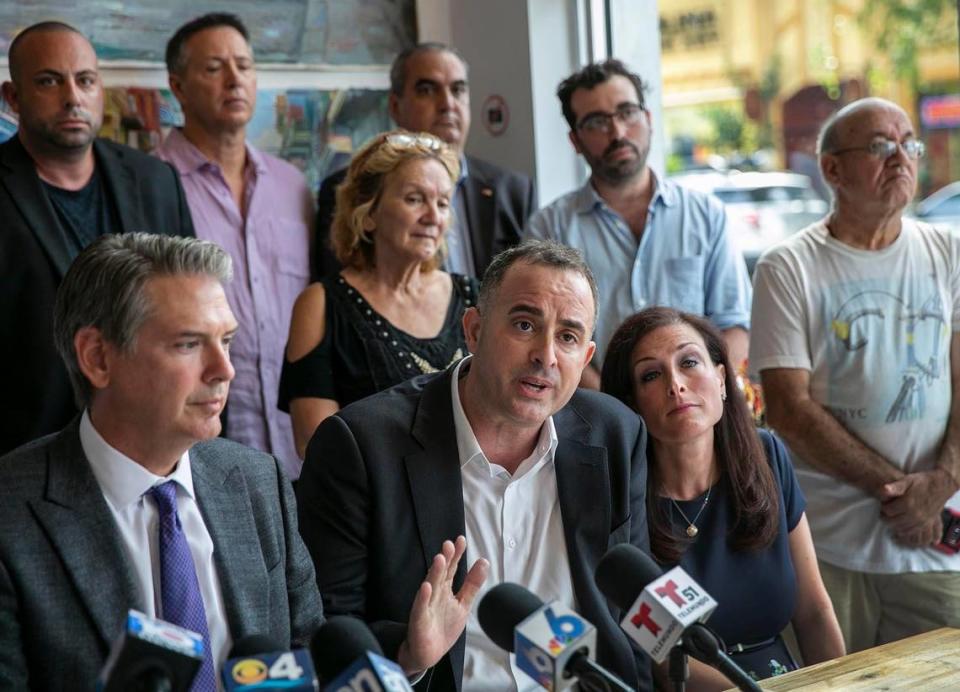Who will pay Carollo’s $63.5 million judgment? Probably not Joe, who hasn’t got the dough

The $63.5 million judgment imposed Thursday by a federal jury on City Commissioner Joe Carollo looks like a very large and scary number.
But who’s going to pay it? Carollo? The city of Miami? No one?
As he prepared for this day of reckoning over a nasty dispute with a couple of Little Havana businessmen, Carollo made a legal move that seemed intended to protect his biggest asset. He redid the title on his Coconut Grove home in both his and his wife’s name.
Read More: Big, expensive legal loss for Joe Carollo. Jury awards Miami businessmen $63.5 million
Meanwhile, some of his fellow city commissioners condemned the massive judgment and fretted over whether Miami’s government might somehow seem on the hook for it. That, legal experts say, seems highly unlikely unless commissioners decided to help defray costs, which would be a politically difficult proposition since it involved taxpayer dollars.
One veteran Miami lawyer said the jury’s damage award might wind up being more symbolic than anything else.
“It’s what we call a paper judgment to decorate your trophy case,” attorney Roy Wasson told the Miami Herald.
The city may have agreed to pay Carollo’s legal tab so far — nearly $2 million before the trial even began — but it was not named as a defendant in the federal civil rights case accusing him of violating the First Amendment rights of Calle Ocho businessmen William “Bill” Fuller and Martin Pinilla. They claimed the politician retaliated against them for backing a political opponent whom Carollo eventually defeated, by directing code enforcement officers to harass the men’s popular nightclub Ball & Chain and other businesses.
The federal jury found that Carollo acted on his own in directing those officers to slap the Ball & Chain bar and Taquerias el Mexicano restaurant with a series of code violations. Jurors didn’t believe Carollo was doing city business while retaliating against them. So the city appears off the hook, at least legally.
“The jury was not asked to make any findings that would give rise to the city’s responsibility” for damages, said Wasson, who reviewed the jury instructions issued by U.S. District Judge Rodney Smith. Therefore, the city has no “vicarious liability” to pay part of the judgment in the civil rights claim against Carollo.
Further complicating the collection of the $63.5 million, Carollo’s lawyers are expected to appeal the jury’s verdict and damage award.
After Thursday’s verdict, Carollo insisted he had exercised his powers as a commissioner properly and that he expected to win in appellate court.
“Today is the first day of this trial,” Carollo told the Miami Herald. “They will have a different look at this, where I think it will be a more level playing field.”
He also questioned such a huge damage award from the jury, saying it exceeded many in wrongful death cases and he “wasn’t accused of killing anybody.”
The six-member jury wound up awarding Fuller $8.6 million in compensation for loss of reputation and business and other costs and another $25.7 million in punitive damages. Pinilla was awarded another $7.3 million in compensation and $21.9 million in punitive punishment.
While the staggering award was a powerful validation for their case, Fuller said after the verdict that although they’re going after the commissioner’s assets to cover financial losses — money wasn’t the main goal of the lawsuit.
“The goal was to stop Joe Carollo from doing this to us and to anyone else,” Fuller said.
If Carollo’s appeal fails, financial records show Carollo doesn’t have nearly enough money to cover the damage award. He earns $58,000 a year as a commissioner and owns a home in Coconut Grove that property records show is worth about $1.6 million. His most recent financial disclosure at the end of 2021 claimed he had $100,000 in his checking account and owed $279,000 to Capital Bank.
As his trial neared conclusion, Carollo filed a quit claim deed on his Morris Lane home in mid-May. He added his wife Marjorie Carollo’s name to the title for the homesteaded property. It may have been a last-ditch effort to protect his biggest asset.
There are other moves the commissioner also could do to limit his financial damage in the future, including retiring. Pensions and social security are usually protected from creditors.

 Yahoo Sports
Yahoo Sports 